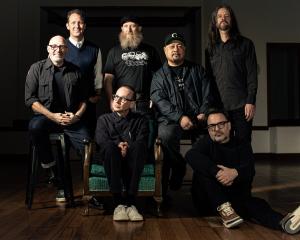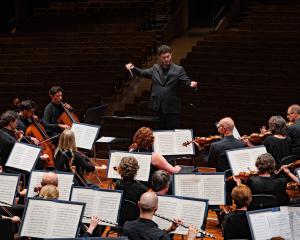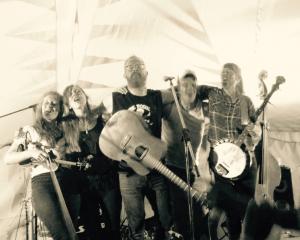No matter what textures Matt Joe Gow clothes his songs in, it always comes back to the melody. The former Dunedin musician, now living in Melbourne, discusses his new album with Shane Gilchrist.
The former Otago Boys' High School pupil and University of Otago philosophy graduate who has lived in Melbourne since 2006 (via stints in Canada, the United States, Europe and England) doesn't limit his journeying to the geographic; his music, too, is evidence of a roaming spirit.
It is three years since Joe Gow released The Messenger, an album covered in the dust of Americana. Released in New Zealand yesterday and in Australia two weeks ago, new album Cities On the Sea, in contrast, shimmers like rain in an urban twilight. Think Manchester, territory of The Smiths and other guitar-driven pop masters.
Fittingly, the cover art of Cities On the Sea is chameleonic; significantly, it omits Joe Gow's name in favour of that of his band, The Dead Leaves. He might remain at the wheel of this machine, but under the hood ticks the engine of a different beast, Joe Gow explained via phone from the kitchen of his Melbourne flat earlier this week.
"I just decided to explore something different. Because you are exposed to so many different forms of music when you're in New Zealand ... it's not like I felt like I have to consistently write in one style.
"Yes, The Messenger was a record I put out, but now, working more collaboratively with The Dead Leaves, this is the sound of four guys.
"But I can see how it might seem quite strange that here's this guy who was doing alt-country who is now playing ... ". Let's finish the sentence for him: shiny, dense, dark, layered pop songs.
Like Joe Gow's previous album, The Dead Leaves' latest has been released by Liberation Music, which operates under the umbrella of Australian music publishing company Mushroom.
"Liberation are behind the record but, ultimately, if radio doesn't play you then you're f ...
"There is only so much a label can do for you. But I can't control that stuff. You make a record then sit back and other people go to work.
"Really, the only thing you can do is make the best record you can and do it justice on the road," the 33-year-old says, adding that he makes enough from music to "get by".
"The music industry only really gets harder, to be honest. But we'll just keep kicking on.
"I'm not a dreamer who sits around thinking about being famous. All my friends who are in what you'd term successful indie bands don't make much. I understand that.
"If our record does well, then Liberation recoups big. But if it doesn't sell, well, it doesn't sell.
"I'm not walking around with a debt on my back. But there is no way I would have been able to make a record like this without a label."
For The Messenger, Liberation paid for the services of influential Australian producer Nash Chambers, whose credits range from Dolly Parton to Jimmy Barnes; this time the record label stumped up for another acclaimed guiding hand, Scott Horscroft.
High-flying New Zealander Gin Wigmore also makes an appearance, providing vocals in a duet, This Living.
"She was living in Sydney at the time and our manager knows her really well. He suggested she come down to the studio," Joe Gow explains. "I was keen to have her sing on that song. Our voices are totally different."
As his stylistic change reveals, Joe Gow is not afraid of taking risks. To prove the point further, The Dead Leaves end their album with a cover of the Talking Heads song, This Must Be The Place (Naïve Melody), albeit in a deconstructed form; the funk of the original is replaced by a darker, more ethereal rendering.
"Some people hate it. If you cover a band like Talking Heads, who have a cult following, you are going to upset some people.
"It's interesting to see the reaction to that song. I have to say, it was calculated. I wanted to gauge reaction ... To me, if you're going to cover a song, you might as well bring something else to the table.
"With The Dead Leaves material I wanted the sonic textures to be greatly different. I wanted an almost post-rock feel to it, with dense layerings and horns and strings on some of it.
"My guitarist is responsible for a lot of the layering, whereas the drummer has these really angular, static beats that are sometimes aggressive.
"I can't speak for the whole band here, but what I wanted to do in terms of lightening the mood somewhat. I didn't want it to be as dark as an Interpol or National album, who we get referenced to a lot over here ...
"I'm a big Smiths fan and some of that pop influence comes through.
"I wanted floaty, ethereal stuff, but anchored to somewhat traditional songwriting. I've always liked songs you can sing along to. For me, it always comes back to the song," says Joe Gow who, having started playing piano at age 5, began putting words to music at 13.
"The first album, because it was a solo album, was more of a personal journey. With this record, I didn't want to go there so much. I wanted people to be able to relate to their own stories and connect to it. There is more of a big-band sound to this album.
"I hadn't worked like this before. I just wanted to try something that was more of a band project.
"It has never been about me trying to become famous. I don't really care about that stuff. It's about doing stuff that is interesting. That's all that matters to me. Otherwise, it's just ... boring."
The album
The Dead Leaves' Cities On the Sea is out now.












